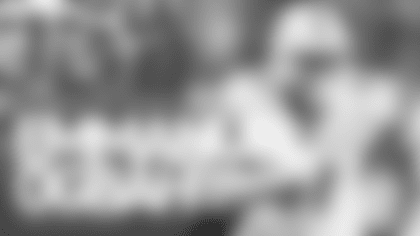Some things Mike Mularkey knew he wanted to do differently this time.
Mularkey, after a two-year stint as the Buffalo Bills' head coach in 2004-2005, said in the six years since he thought often about he how would approach a chance to interview again for an NFL head coaching position. And if he got the job?
Without question Mularkey said there were things he would change.
"I absolutely learned from that experience," Mularkey, hired three weeks ago as the Jaguars' head coach, told jaguars.com recently.
One of the things involved hiring a staff.
Mularkey put the finishing touches on his coaching staff late last week, and said there were times during the process he approached it differently than he did in Buffalo. He also said the process as a whole was made easier by the communication between him and Jaguars General Manager Gene Smith.
"Your first time in the process as a rookie head coach you're trying to get in the door to get one of these jobs," Mularkey said. "There are things that go on in the process where you may have a plan going in, but maybe that plan gets altered during the discussion of the job.
"That may involve keeping or hiring certain coaches or (the team) 'highly suggesting' this or that. To get my foot in maybe further than someone else, I made some adjustments that in the long run I maybe wish I wouldn't have. That was not the case here and during my interview I made clear some of the things that I did that I learned from and hopefully would not have to go through again."
Mularkey said he had final say on the 20 assistants hired in recent weeks, and though he and Smith discussed each one, "There wasn't a tug-of-war on anybody we hired."
"It was very clean," Mularkey said. "There was a method to our madness of how we were going to try to attract the best coaches out there and it really fell into place."
Here is more from Part 1 of jaguars.com's recent interview with Mularkey. Part 2 is scheduled to run Wednesday.
* *
You're essentially done putting together your coaching staff. People who have never been close to that process may not realize it's a pretty intense process . . .
I'd say hectic is a good word for it. It's very time-consuming and we were very diligent in the way we did things. We realized there were some openings and we realized there were some top guys who were available we had targeted, from the time of my interview even. I think we accomplished what we had set out to do a couple of weeks back. It's a time-consuming process, because you're talking to at least three or four candidates for each position, and it's a cycle. You start early in the morning and go until late at night. We ended up hiring 20 new coaches, including strength coaches and assistants, so it was time-consuming and a little exhausting.
You were hired relatively quickly after the season. It seems like it may have been an advantage to have been able to get an early start in the process of hiring a staff. Was it, and in what way?
We were very fortunate we were able to get started when we did. I think a lot of the guys wanted to be here for one reason or another. I think they just felt like it was the right place to be at this time in their careers. We had a couple of coaches who had chances to go to a couple of other teams. Really, I did not mind that. I felt at least they would have a chance to see what was out there, knowing that if they did come back and join our staff that they were all-in and we'd know it was the right fit for them.
* *
You mentioned a method to the madness. What was the method?
Loyal coaches, people I trust – that was very important. They didn't have to have worked for me before, but people I know in the league who I trust – if they endorse them, then I'm on board with it. It's not always about working with somebody before, but I try to target as many people who have been head coach/coordinator-type guys to join us, because that's just more people with more experience and more creativity – more ideas and more input. Really, the bottom line was trying to get really good group people who were in the same boat that I was, for the same reason – for no other reason than to help players be successful on the field.
Some of the best interviews are two-way streets, with both sides deciding if it's the right move for both sides. Was there an element of that in this process?
That was extremely important. All of us somewhere down the line may have been somewhere where it wasn't a good experience, for one reason or another. Everyone I've talked to over their coaching career, there has been some place or another – some in the past, some recent – that their experience was not good. They needed to understand that I've had those as well, and that I wanted to create a good environment where coaches and players enjoy coming to work. That's important to me. I think this is a tough business. Being a former player and understanding it and obviously being a coach for the last 18 years, I understand the demands on you physically and the demands on your family and the demands you put on yourself. I want guys who like coming in this building. I know if they're happy they're going to be much better coaches in that office. I think they needed to see that's the way I operate. I need a good experience. I'm going to create one for these guys and hopefully, the players will see that as well.
Talking to people at the Senior Bowl, it was striking how many people talked highly of Jerry Sullivan, who you hired as the wide receivers coach. Considering the importance of that position, how happy were you to get a coach of his experience and reputation at that position?
Extremely thrilled. I've never worked with Jerry, but I know what Jerry has done in his career and the production of the receivers that he either has coached or trained in the off-season, or off to the side when he hasn't been on a staff. I just know he's passionate about what he does and I know he has a way about him with his demands that he gets the best out of his guys. I felt like there were two top coaches at the time when we were looking at that position. Jerry was one, and I was with Terry Robiskie in Atlanta. I thought they were the top two. We tried for both. We were really lucky to get one of them, but my feeling on Jerry was he was one of the best out there.
* *
Jerry had the option of staying retired, but chose to coach. He said a big reason was a chance work with you and be a part of what's going to happen in Jacksonville . . .
To get coaches like that who did have other opportunities – and one of those opportunities was retirement – for them to want to stay with his because of the environment is nice. I think he saw the quality of the staff we were putting together and the experience he could have here with our offense – and especially at that position, where he can help some young players. I think it's what drives him, and he sees he has a chance to work with young players and hopefully put great things in. He has great background with the players he has developed.
Talking to your special teams coach, John Bonamego, at the Senior Bowl, he mentioned that a big part of the success of a coaching staff was chemistry – perhaps as much as overall coaching ability. How important to you is that chemistry on a staff?
I feel that already with our staff. Monday was our first day together, but a lot of guys know each other already and a lot of guys know of each other. The one thing that was important was I wanted to make sure guys could work together. For example, I went after two guys who could be potential head strength coaches. I got both of them. One agreed to be an assistant, but I told them, 'if I felt there was not going to be a good level of communication and a good working environment between the two of you, I would not put either one of you in it because it will directly reflect on our staff eventually.' I just think we have the right people. There are going to be disagreements. That goes on every staff, but these are the kinds of guys who when they walk out of a room the respect will not ever be dropped. I feel good about everybody, the people and personalities that they are.














